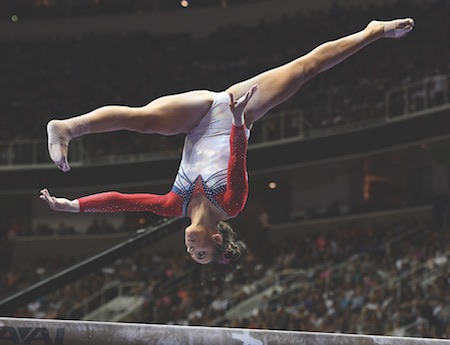NBC Banking on the Games To Unite a Frayed Nation

The smarter way to stay on top of broadcasting and cable industry. Sign up below
You are now subscribed
Your newsletter sign-up was successful
Related: Lazarus Tees Off on No-Show Golfers
While the Olympics always represents a plum opportunity for a nation to root together for our elite athletes on the global stage, the persistent unrest plaguing the U.S. gives NBC an even greater chance to unify a nation torn apart by police-related killings and divisive politics. Starting with the opening ceremony in Rio on Aug. 5, NBC will offer 17 days of programming—6,700 hours in total—that American viewers can presumably find common ground in.
“Sports are the great escape,” said Neal Pilson, former CBS Sports president and founder of Pilson Communications. “A lot of people are dealing with troubling, anxious moments outside of sports, and the Olympics are probably the most dominant event in terms of their unifying capability.”
Brazil offers its own variety of domestic strife, from presidential impeachment proceedings to an economic crisis to the notorious Zika virus, which has prompted Today anchor Savannah Guthrie, who is pregnant, and a cadre of famous golfers to stay home. Jim Bell, executive producer of NBC’s Olympics coverage, called Zika “a very serious issue,” but noted how problems great and small become magnified when the Games are involved. “I’m wondering if the Olympics weren’t taking place in Rio, how many Zika headlines there’d be,” Bell said at a Paley Center panel on the Olympics in late June. “I think it’s just a matter of context and proportion and balance in the coverage.”
With key anchors in Rio, including Matt Lauer and Lester Holt, network executives have vowed to cover all relevant hard news in Brazil, much of it in an Olympics preview show. “If it’s strictly a news item, News will be there to cover that,” Mark Lazarus, NBC Sports Group chairman, said at a press event July 11. “I think we’ve handled that responsibility well over time, and I’m confident we will again.”
The World Is Watching
Olympics viewing continues to rise with each new Games. The 2012 London Olympics had 217 million total viewers, according to NBC, ahead of Beijing’s 213.6 million in 2008. Call it the rubberneck effect—the turmoil in Rio may only serve to increase viewership, Pilson believes. “I think the public will be curious and will tune in to see what’s going on,” he said.
The smarter way to stay on top of broadcasting and cable industry. Sign up below
As always, the Games arrive with a number of compelling human interest stories, including Michael Phelps’ sustained dominance in the pool, Jamaican sprinter Usain Bolt’s on the track and gymnast Simone Biles overcoming childhood hardship. The U.S. women’s basketball team is seeking its sixth straight gold medal, and the reintroduction of golf and rugby in the Olympics further spices up the sporting smorgasbord.
Also working in NBC’s favor is the time zone, with Rio just an hour ahead of the Eastern U.S.
NBCUniversal is deploying its “symphony” game plan for the Games, including using its cable channels—CNBC, MSNBC, Bravo, etc.—to blanket the action. NBC will live-stream every athletic contest. While Bell said primetime represents upward of 70% of the network’s Olympics revenue, concerns about cannibalizing the “mother ship” telecast by doing so, he said, have largely dissipated. “The information seems to be, you provide more content, you get more viewers,” said Bell. “It’s the rising tide lifting all boats.”
Pilson believes there’s no such thing as too much sports content for fans. “There’s no evidence that the number of platforms carrying sports events decreases your audience—none,” he said.
The 6,700 hours of programming for authenticated users is a startling increase from the 171.5 hours NBC aired from the 1996 Games in Atlanta. NBCU is also working with Snapchat and Buzzfeed to increase its social offerings; a dozen Buzzfeed producers will be among the 2,200 NBCU staffers in Rio, serving up Olympians’ backstories to a range of younger consumers.
Brian Roberts, chairman/CEO of NBCU parent Comcast, showed off the cable giant’s new tech toys at the July 11 event, including the X1 platform, a customizable digital experience focused on a particular athlete or event, and voice remotes providing additional Olympian minutia. He described Comcast’s Olympics strategy as “a laboratory for the future of television.”
Five years ago, Comcast coughed up $4.38 billion to broadcast the Olympics through 2020. It’s an enormous bet, and NBC is banking on the Games being precisely what the nation needs right now. “This is not just unifying in terms of the country,” said Bell, “but hopefully in terms of households, with families watching and enjoying the Olympics together.”
Michael Malone is content director at B+C and Multichannel News. He joined B+C in 2005 and has covered network programming, including entertainment, news and sports on broadcast, cable and streaming; and local broadcast television, including writing the "Local News Close-Up" market profiles. He also hosted the podcasts "Busted Pilot" and "Series Business." His journalism has also appeared in The New York Times, The L.A. Times, The Boston Globe and New York magazine.

